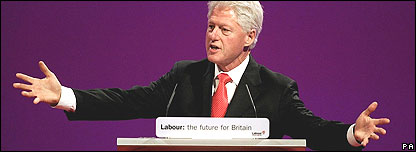
You and me, me and you, lots and lots, for us to do
|
By Sean Coughlan
BBC News Magazine
|

Bill Clinton told the Labour conference to get into ubuntu. Eh?
Ubuntu. That was what Bill Clinton told the Labour party conference it needed to remember this week. "Society is important because of Ubuntu."
But what is it? Left-leaning sudoku? U2's latest album? Fish-friendly sushi?
No, it's a word describing an African worldview, which translates as "I am because you are," and which means that individuals need other people to be fulfilled.
The former president, husky-voiced and down-home with the delegates, gave it a folksy flavour, describing it in terms of needing to be around others to enjoy being ourselves.
"If we were the most beautiful, the most intelligent, the most wealthy, the most powerful person - and then found all of a sudden that we were alone on the planet, it wouldn't amount to a hill of beans," said Mr Clinton.
The word comes from the Bantu languages spoken in southern Africa - and is related to a Zulu concept - "umuntu ngumuntu ngabantu" - which means that a person is only a person through their relationship to others.
And it's entered the political lexicon through the political changes in South Africa.
Archbishop Desmond Tutu, in his book No Future Without Forgiveness, says: "Ubuntu is very difficult to render into a Western language... It is to say, 'My humanity is caught up, is inextricably bound up, in what is yours.'"
Decline
In his definition, it means that there is a common bond between people - and when one person's circumstances improve, everyone gains and if one person is tortured or oppressed, everyone is diminished.

Ubuntu chic - thong name-checking Ubuntu open-source software
|
Mr Tutu's identification with ubuntu has given rise to the idea of "ubuntu theology" - where ethical responsibility comes with a shared identity. If someone is hungry, the ubuntu response is that we're all collectively responsible.
There is a spiritual as well as practical dimension to this - with ubuntu reflecting the idea that we're part of a long chain of human experience, connecting us to previous and future generations.
Ubuntu has also entered the language of development and fair trade - with campaigners using the word in aid projects for Africa in ways that suggest this will be an African solution for African problems.
Ironically, says Rob Cunningham, Christian Aid's programme manager for South Africa, just as the word is taking off in Western society the values it embodies are in decline in the land of its origin.
"In my conversations with partner organisations and the communities they work with, and among older people, there's a deep sense of loss of ubuntu," says Mr Cunningham. "To me, it means sitting down in a Zulu hut in KwaZulu-Natal sharing scarce food and a brew and a few stories."
There are ubuntu education funds, ubuntu tents at development conferences, ubuntu villages, an ubuntu university - and it's now the name of an open-source operating system.
Expect to hear more from ubuntu in the future.
Add your comments on this story, using the form below.
Ubuntu is an excellent traditional as well as modern Africa worldview. The concept has a powerful meaning and potential to transform the world into one of better understanding and respect for every human being - it is about treating others as we would to be treated. It is about a sense of sharing, belong and togetherness including the fact that no human being is an island. Thanks Bill for the timely advice to Labour and the world.
Dr. Kennedy Lweya, Haywards Heath
No man is an Island and a tree cannot make a forest so the saying goes in Bini, Edo state of Nigeria. I strongly agree with former President Clinton in the use of the word Ubuntu. Let us be our brothers' keeper. The fortunate should lend a helping hand to the unfortunate. Unity is strength.
Omorodion Osula, Boston, USA
The essence and depth of 'ubuntu' as a concept lies in the age-long African philosophy and practice of communalism and shared objectives.
You are your neighbours' keeper. With the emergence of 'western civilization' we are increasingly becoming individualistic and competitive. Capitalism and the philosophy of every person for himself is a challenge for ubuntu. We are all extricably linked and if you buy into the philosophy of ubuntu then I have your back and you have mine. I am because you are - togetherness is it.
Lawrence Mba, Toronto, Canada
"Umuntu" is a concept that the west struggles to grasp. People in the West are so individualistic, whereas in Africa its all about community.In Africa you cannot seperate yourself from your community. For example, I am from Highfield, Harare Zimbabwe, and I grew up knowing about 95% of my neighbors, all the way up to six streets down. I am now a student in the USA and I hardly know the people that stay next door.
Muchengetwa Bgoni, Missouri, USA
Ubuntu is at the heart of the South African truth and reconciliation process. The term Ubuntu, according to Tutu, has perhaps its equivalent in Western world: ¿I think therefore I am.¿ The Ubuntu version of this same concept would be translated as ¿I am human because I belong. I participate, I share.¿ Ubuntu embraces the worst in the other with the awareness that I would have done the same evil if I were in their shoes. It comes from the grim realisation that in as much as people are capable of doing good, there is always a danger of an evil force that works at various levels possessing people and making them do things that they would not normally do.
Dawit Yehualashet, Ethiopian in Goshen, IN, USA
Wasn't it his wife who said, also from an African proverb, "It takes a village to raise a child"? Maybe it all depends how you define Ubuntu!
Anthony J. Ipie, La Paz
I prefer Thatcher's folksy speech. 'There is no such thing as society.' I wonder if Clinton referenced ubuntu to Hillary after his heavy dose of it whilst president.
Dylan, London
Bill Clinton says get into Ubuntu, just a second I've CD with it on in my bag. Yup here it is "Ubuntu - linux for human beings". Bill Gates ain't going to like this.
Simon Monday, Godalming
The BBC may edit your comments and not all emails will be published. Your comments may be published on any BBC media worldwide.
|
~RS~q~RS~~RS~z~RS~27~RS~)
~RS~q~RS~~RS~z~RS~27~RS~)
Bookmark with:
What are these?